(3) Assistance for Security and Stability
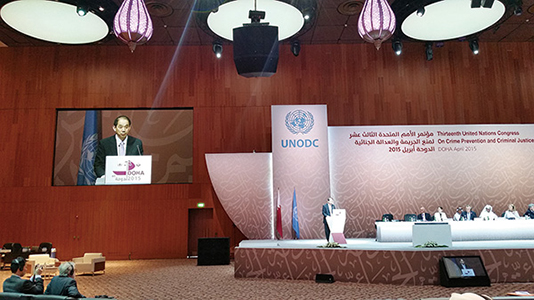
The Thirteenth United Nations Congress on Crime Prevention and Criminal Justice (the largest UN international conference in the field of crime prevention and criminal justice held every five years) took place in Doha, Qatar, in April 2015. It was decided that Japan will host the next congress in 2020.
Globalization, the advancement and proliferation of high-tech devices, and expanded mobility has turned transnational organized crime and acts of terrorism into a threat to the entire global community. In recent years, transnational organized crime, including illicit trafficking in drugs and firearms, trafficking in persons, cybercrime, and money laundering, has become increasingly diversified and sophisticated in its methods. Not only are groups which are affiliated with and influenced by Al-Qaeda and other international terrorist organizations becoming increasingly active in Africa and the Middle East, but also individual acts of terrorism, influenced by violent extremism, as well as foreign terrorist fighters pose a grave threat. In addition, piracy off the Coast of Somalia and in the Gulf of Aden in eastern Africa, the Gulf of Guinea in western Africa, as well as in the waters of Southeast Asia is still a concern.
There are limitations for any one nation in effectively dealing with transnational organized crime, acts of terrorism, and piracy. Therefore, not only must each nation strengthen its countermeasures in each respective area, but the entire international community must work together to eliminate legal loopholes in the international system through efforts in criminal justice and law enforcement capacity building assistance in developing countries.
< Japan’s Efforts >
| Enhancing the Capabilities of Security Authorities
In the area of capacity building of police agencies that constitute a cornerstone in maintenance of domestic security, Japan provides support with a combination of the transfer of the knowledge and technology based on the track records and experiences of the Japanese police in international cooperation, maintenance of facilities and provision of equipment, while emphasizing the development of human resources, including improvement of systems and enhancement of administrative capabilities.
Japan provided approximately $1.7 billion (approximately ¥165.3 billion) in assistance to Afghanistan over the period of 2001 to the end of October 2015 in order to improve public safety in Afghanistan where the public safety situation has remained unpredictable. Thanks to this assistance from Japan as well as the international community, the Afghan National Police more than doubled its workforce from 72,000 in 2008 to 157,000 in 2012.
The National Police Agency (NPA) of Japan dispatches experts to and accepts trainees mainly from Asian countries such as Indonesia and the Philippines. Through this cooperation, Japan strives to transfer the attitudes, investigative abilities, and forensics technology of the democratically controlled Japanese police, who are trusted by the Japanese people.
Additionally, senior police officials from Turkey were invited to Japan where they took part in discussions with senior officials from the NPA and observations of prefectural police departments in an effort to foster mutual understanding as well as improve and strengthen cooperation.
Brazil
Project on Nationwide Dissemination of Community Policing
Technical Cooperation (January 2015 – Ongoing)
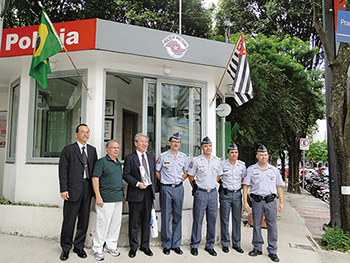
At a Sao Paulo State koban. (Third from the left, former JICA President Akihiko Tanaka) (Photo: JICA)
Brazil suffers from a very high rate of murder, armed robbery, assault, and other crimes, particularly in urban areas. To tackle the situation, the country has been strengthening an initiative that seeks to eliminate social instability through policing for the people, with the people, since the 1990s. Specifically, the Military Police of Sao Paulo State launched an initiative in 1997 to incorporate a Japanese-style policing system of stationing small-scale police stations throughout the community, and has since enhanced its community policing activities with the assistance of the Government of Japan.
Building on these efforts to enhance community policing activities in Sao Paulo State, the Government of Brazil decided to use Japanese know-how to expand such activities in other states as well.
At the same time, following on from the 2014 FIFA World Cup, Brazil will also host the 2016 Rio Olympic and Paralympic Games in Rio de Janeiro. As such, improving public safety is an urgent task for attracting and holding such large-scale events.
In light of this, Japan began providing support for further improving the quality of community policing activities in Brazil and expanding these efforts nationwide in 2015, based on its own track record in this field.
Thanks to efforts to date to promote widespread community policing activities, there is heightened awareness in Brazil about the importance of not only the police’s response to crimes after they occur, but also their efforts to prevent crimes before they occur. This is a clear sign that the initiative is taking effect. In addition, according to the Government of Brazil, increased awareness about community policing activities and crime prevention has significantly reduced the crime rate in a number of regions compared to 10 years ago.
The enhancement of community policing activities with Japanese assistance is catching on across Brazil. It is hoped that these activities help to significantly reduce crime throughout the country. (As of August 2015)
| Counter-Terrorism
The international community must make every effort to prevent the means of terrorism from falling into the hands of terrorists and deny them safe havens. To assist the efforts by the international community, Japan provides capacity building assistance to developing countries that are not equipped with sufficient capabilities. In particular, for Japan, preventing terrorism and ensuring security in the Southeast Asian region, with which Japan has a close relationship, as well as in Algeria, where Japanese nationals were victimized by the terrorist attack in 2013, and its neighboring countries in North Africa and the Sahel region, have a particular significance. Thus, Japan is focusing its support on these regions.
In 2015, a terrorist incident regarding the murder of Japanese nationals occurred in Syria. Meanwhile, in Paris, there were a shooting incident in January of the same year and simultaneous terrorist attacks in November. In addition to these, there were a number of terrorist attacks around the world instigated by Islamic extremist organizations such as the Islamic State of Iraq and the Levant (ISIL). For this reason, countering those influenced by terrorist organizations, and their violent and extremist ideologies is becoming a more significant issue for the international community.
In response to this issue, the Government of Japan is strengthening its efforts, and as part of this, Prime Minister Shinzo Abe announced in January 2015 that humanitarian aid totaling approximately $200 million will be provided to countries in the Middle East. In the wake of the terrorist incident regarding the murder of Japanese nationals in Syria, Japan announced comprehensive diplomatic policy that consisted of the following three new pillars: (i) strengthening counter-terrorism measures (providing $15.5 million for counter-terrorism capacity building assistance for the development of legal systems, border control, etc. in the Middle East and Africa; (ii) enhancing diplomacy towards stability and prosperity in the Middle East; and (iii) assistance in creating societies resilient to radicalization (initiatives to address unemployment and improvement of income disparity, assistance in education, expanding people-to-people exchanges, cooperation with ASEAN aimed at promoting moderation and others).
Based on these new policies, Japan is proactively assisting other countries for counter-terrorism, countering foreign terrorist fighters (FTF), addressing violent extremism, and others. Thus, Japan will accelerate efforts aimed at the peace and stability of the international community from Japan’s standpoint of Proactive Contribution to Peace.
| Measures against Transnational Organized Crime
As globalization advances, the threat of transnational organized crime that is conducted on a large-scale and systematically across different countries is becoming more serious. Transnational organized crime undermines the security of civilian society, rule of law and market economy, which form the foundation of social prosperity and well-being. Thus, transactional organized crime is an issue that needs to be addressed uniformly by the international community. Japan is mainly engaged in the following international contributions to combat transnational organized crime.
| Measures against Drug Trafficking
Alongside its active participation in international conferences such as the Commission on Narcotic Drugs, Japan has also provided financial contribution to the United Nations Office on Drugs and Crime (UNODC), to support the counter-narcotics efforts primarily in Southeast Asian countries and Afghanistan. In FY2014, Japan provided funding in the amount of approximately $4.3 million for counter narcotics projects implemented by UNODC to advance the fight against the growing worldwide distribution of synthetic drugs such as new psychoactive substances and methamphetamine. These funds were also widely used to control precursors (ingredients for making stimulants) in West Africa, promote alternative development and border security in Afghanistan and prevent drug abuse in Central Asia.
Additionally, the NPA of Japan invites senior drug investigators from mainly the Asia-Pacific region to attend discussions about the narcotics situation in their countries, narcotics crime investigations and international cooperation in the field. It is aimed at establishing and strengthening international networks on drug enforcement of relevant countries.
| Measures against Trafficking in Persons
With regard to measures against trafficking in persons,* based on the recognition that trafficking in persons is a serious violation of human rights, Japan provides various forms of assistance to combat trafficking in persons under the 2014 Action Plan to Combat Trafficking in Persons, which was revised in December 2014 for the first time in five years.
In particular, through contributions to the International Organization for Migration (IOM), Japan assists the safe repatriation of victims of trafficking in persons protected in Japan and provides education, vocational training, and other forms of assistance to these individuals in their home country after repatriation to prevent them from falling victim to trafficking in persons again. In FY2014, Japan provided a total of approximately $970,000 through UNODC to help strengthen law enforcement capabilities for trafficking in persons in Southeast Asia and Africa. Furthermore, Japan actively participates in the Bali Process, which is an Asia-Pacific regional framework on people smuggling, trafficking in persons and transnational crime, and shares information with other countries to eliminate trafficking in persons.
| Measures against Money Laundering
There is a high risk that proceeds of transnational organized crime will be used to fund further organized crime or terrorist activities, and thus eliminating flows of these illegal funds is an important task for the international community. Therefore, Japan, too, actively participates in discussions on international measures against money laundering and terrorist financing through intergovernmental frameworks such as the Financial Action Task Force (FATF) established by the G8 in 1989. In FY2014, Japan contributed approximately $300,000 to a UNODC project to support counter-terrorist financing measures in the Sahel region.
| Capacity Building for Maritime, Outer Space, and Cyberspace Issues
| The Seas
As a maritime nation, Japan depends largely on maritime transport for the import of energy resources and food. Ensuring maritime safety is an issue that has a direct link to Japan’s prosperity and existence as a nation and of crucial importance for the economic development of the region.
In recent years, many incidents of piracy(Note 21) occurred off the coast of Somalia and in the Gulf of Aden in Eastern Africa, while the number of pirate attacks fell sharply from 237 in 2011 to 15 in 2013 and 11 in 2014 as a result of the efforts by the international community. Despite the decrease in incidents of piracy, the root causes that spawn piracy have remained unsolved, including the issues of poverty and unemployment among young people in Somalia. Moreover, Somalia transitioned from the Transitional Federal Government to Federal Government recently, in August 2012, and still lacks adequate capacity to independently crack down on piracy. Considering the fact that the crime organizations that conduct acts of piracy have not been eradicated, the situation still requires caution. If the international community relaxes its efforts, the situation could easily reverse.
As part of the initiatives to deal with the issue of piracy off the coast of Somalia, Japan has been implementing anti-piracy measures, such as deploying two destroyers and two P-3C maritime patrol aircrafts of the Maritime Self-Defense Force to conduct escort activities and surveillance activities for preventing piracy in the Gulf of Aden and off the coast of Somalia, based on the Act on Punishment and Countermeasures against Piracy enacted in June 2009. Japan Coast Guard law enforcement officers are also on destroyers to make arrests, question detainees and perform other duties of judicial law enforcement activities when acts of piracy are committed. Since December 2013, Japan has participated in Combined Task Force 151 (CTF 151), a multinational task force for countering piracy, in order to effectively carry out anti-piracy activities in cooperation with other countries’ naval units engaged in anti-piracy operations. In July 2014, Japan decided to dispatch a commander and staff to CTF151 from the Japan Self-Defense Forces (JSDF). From May to August 2015 Japan dispatched a commander to CTF151 from the JSDF for the first time.
Resolving the Somali piracy problem requires enhancement of the maritime law enforcement capabilities of coastal countries and multilayered efforts aiming for the stabilization of the situation in Somalia, which is of particular relevance to the expansion of piracy activities, in addition to the above-mentioned activities on the sea. As part of these efforts, Japan contributed a total of $14.6 million to the IMO Djibouti Code of Conduct Trust Fund, which was founded by the International Maritime Organization (IMO)(Note 22) to implement the Djibouti Code of Conduct (a regional framework for improving capabilities for maritime law enforcement in Somalia and its neighboring countries), which is promoted by the IMO. This Trust Fund has been used to upgrade and operate information-sharing centers for anti-piracy measures in Yemen, Kenya and Tanzania, and to establish a Djibouti Regional Training Center. Currently, the IMO is also conducting training programs to improve maritime security capabilities in countries surrounding Somalia.
In addition, Japan has contributed a total of $4.5 million to the Trust Fund to Support Initiatives of States Countering Piracy off the Coast of Somalia. Its purpose is to assist Somalia and its neighboring countries to improve their capabilities, in order to arrest and prosecute alleged pirates. Japan has been supporting the international community striving to arrest and prosecute pirates, and prevent the reoccurrence of piracy. In addition, in cooperation with the Japan Coast Guard, Japan has carried out training programs for the control of maritime crime, inviting maritime security officers from the countries around Somalia. Furthermore, since 2007, Japan has disbursed approximately $371.37 million to Somalia in assistance to strengthen domestic security, provide humanitarian assistance, and develop the infrastructure within Somalia, in order to bring peace to Somalia.
Djibouti
The Project for the Construction of Patrol Vessels for Enhancing the Ability to Secure Maritime Safety and Security
Grant Aid (May 2013 – Ongoing)
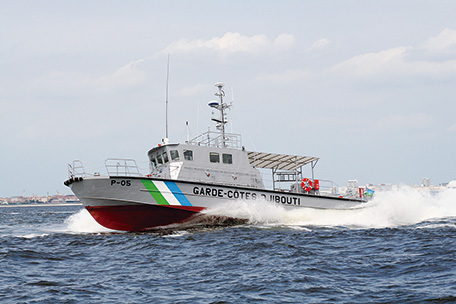
A donated patrol boat. (Photo: Sumidagawa Shipyard Co., Ltd.)
In the Gulf of Aden off the coast of Djibouti, some 17,000 commercial vessels (including about 1,700 Japan-related ones) navigate every year. However, frequent pirate attacks including hijackings have occurred in these waters in recent years, posing a threat to the safety of a critical maritime route of global trade.
These waters are also facing problems such as illegal fishing, migration, and smuggling of goods.
Based on the recognition of the importance of these waters as a trading hub for landlocked countries such as Ethiopia, the Government of Djibouti has addressed these issues by establishing its coast guard. However, due to its recent establishment, the Djibouti Coast Guard lacked enough vessels to cover a wide sphere and could not patrol the waters effectively.
In light of this situation, Japan assisted Djibouti with the construction of two patrol vessels through a grant aid project in 2014.
These patrol vessels, whose construction was completed in 21 months including the detailed design phase, are categorized as the “Craft Large” class with their 20 meter length. With these vessels being on duty, the Djibouti Coast Guard will be able to expand its range of activity and improve its response to calls for service. It will contribute to ensuring the safety and the security of Djibouti’s coast, which is an important international trade route, and its socioeconomic activities.
In addition, Japan is also conducting the Project for Capacity Development of the Djibouti Coast Guard for developing its personnel and enhancing its organization. Through this project, Japan aims to reinforce the Djibouti Coast Guard in both aspects of personnel and equipment by deploying experts including Japanese coast guard officers to Djibouti.
Japan’s assistance is contributing to preventing transnational crimes in this region, called the Horn of Africa, a strategic location for international traffic. (As of August 2015)
| Outer Space
Japan is implementing ODA utilizing space technologies as part of its efforts to address global issues, including climate change, disaster risk reduction, forest conservation, and resources/energy. In Brazil, from 2010 to 2014, Japan worked on the development of assessment technologies for carbon dynamics in a wide area of forests using satellite data in order to reduce carbon emissions and stop the destruction of forest in the Amazon which is one of the world’s largest forests.
Additionally, in 2014, the Ministry of Land, Infrastructure, Transport and Tourism (MLIT) commenced a crustal deformation monitoring program for the Asia-Pacific region, which is prone to frequent large-scale earthquakes, to utilize geodetic survey technology from space through multinational cooperation in order to identify plate movements, earthquakes, volcanic activity and other crustal deformations, and share this data, analysis results and disaster information with other countries in the region.
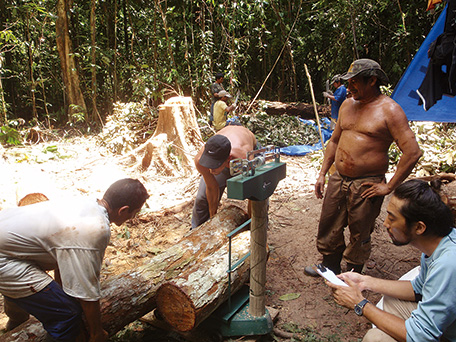
“Ground teams” measure the weight of all trees within a radius of 20 meters to estimate carbon storage at the survey site in the upper stream of the Amazon River. (Photo: JICA)
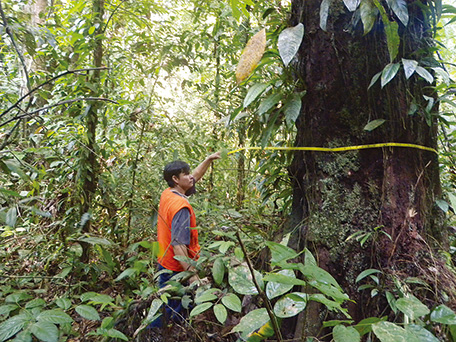
The project employs ground data on forests and land from more than 1,000 locations as well as the latest satellite imaging technology to establish carbon dynamics measurement methods for the Amazon rainforest. (Photo: JICA)
| Cyberspace
An open, fair and safe cyberspace is a common global space enabling worldwide communication and a basic foundation for peace and stability in the international community. However, the advancement of information and communications technology (ICT) has caused cybercrime to become more sophisticated and complex. Moreover, cybercrime knows no borders. Japan promotes international coordination with the aim of dealing with increasing cases of cybercrime. In particular, Japan works on the capacity building for judicial and law enforcement agencies in the Asia-Pacific region. In FY2014, Japan contributed $100,000 to the Crime Prevention and Criminal Justice Fund (CPCJF), and in collaboration with the United States and Australia, supported efforts to enhance Southeast Asian countries’ capacity of tackling cybercrime.
In addition, the Ministry of Internal Affairs and Communications (MIC) promotes collaboration with ASEAN countries in the field of cybersecurity. These efforts include the PRACTICE Project which shares information based on the collection and analysis of information on cyber attacks, exchanges data on cyber attacks, and establishes technologies to immediately detect and respond to indications of a cyber attack as well as the Daedalus system developed by the National Institute of Information and Communications Technology (NICT) to detect malware infections in real time.
In January 2015, with the cooperation of NPA, JICA carried out an issue-specific training course for participants from 12 countries(Note 23) in Asia, Latin America and Africa which offered a practical training to create capacity building action plans to tackle cybercrime.
Additionally, a JICA technical cooperation project in Indonesia is being implemented from 2014 to 2017, which aims to improve its information security capabilities through the dispatch of experts, implementation of training sessions and introduction of new software.
In July 2015, Japan dispatched a cybersecurity survey team to Viet Nam comprising officials from MOFA, National Center of Incident Readiness and Strategy for Cybersecurity (NISC), and JICA. This survey team interviewed officials from the Government of Viet Nam about the current state of cybersecurity in Viet Nam as well as human resources development efforts and challenges. They also visited related facilities, and reviews of capacity building in the field of cybersecurity to Viet Nam will be advanced.
- *Trafficking in persons
- Trafficking in persons refers to the act of the recruitment, transportation, transfer, harboring or receipt of persons for the purpose of exploitation, such as forced labor or prostitution.
- *Money laundering
- Money laundering refers to the act of disguising criminal proceeds as legally obtained assets, or the act of hiding such funds. For example:
An act where a drug dealer hides money obtained through drug trafficking in a bank account opened under a false name.
- Note 21: Typically, pirates off the coast of Somalia and in the Gulf of Aden attack a ship navigating in the water with automatic rifles and rocket launchers, take control of the ship, and demand ransom for the safe release of the crew.
- Note 22: An organization to promote international cooperation on maritime affairs. IMO is one of the 15 specialized agencies of the United Nations including the IMF and World Bank Group.
- Note 23: Bangladesh, Bolivia, Botswana, Côte d’Ivoire, Indonesia, Mexico, Mongolia, Myanmar, Pakistan, Panama, the Philippines and Seychelles
